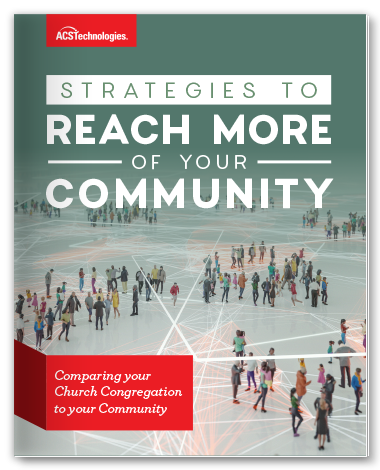It’s time to be prepared for the church’s annual report as you’ve been contemplating, in tandem, the importance of vision casting. So who are your church members, and what is your local impact? How are you measuring this? How does technology affect the church in regard to research and development? When you are ready to compare details about your community to the specific households in your church, MissionInsite provides personalized ministry answers as outlined in a new resource guide.
Why is the mapping of your church community so important? As a ministry leader, you have many ministry ideas for church growth, and you want to serve all people well. Leading a church means casting a vision and working to fulfill that vision. It also means existing in the daily needs of people in your congregation and community. When you can connect personally with people, you discover the challenges in their lives. As a result, you will gain more clarity in how to better carry each other’s burdens, according to Galatians 6:2.
Starting with a congregant contact list is doubly advantageous, as explained in a previous blog, Why an Updated Address List Matters for Your Church:
- Asking for their updated contacts on a regularly scheduled basis makes people feel part of the church and lets them know that your connection matters.
- Enabling you to properly map your congregants with the intent to understand who you are as a church and how you compare to your local community.
Frankly, ignoring this type of technology means you will continue to miss opportunities to make connections with people both in your church and your community. Church technology exists to support and enhance – not detract from – real-life fellowship, worship, and growth. For example:
- Problem: The economic downturn has impacted many of our tables and will for some time.
- Solution: What if your church was more than capable of financially sponsoring families in need identified by the mapping process?
- Problem: Tutoring and afterschool clubs are in high demand.
- Solution: What if your church was full of congregants, thanks to the mapping process, who are more than capable of donating talents and time to invest in a community mentorship/discipleship program?
There are many practical and spiritual case scenarios in which you can be the hands and feet of Jesus. But the question remains. How can you remain passionate about your mission if you don’t know who they are or how you’re best equipped to help them? Let’s change it up and ask, what if your local community could better aid your church congregants? This is what community is. None of us is better than the other. We link arms and live in harmony without conceit and associating with all people (Romans 12:16).
Mapping your community (and organizing it well) makes all the difference for your outreach ministry teams. It makes them efficienct and boosts their impact. Data is a critical asset in today’s church. When it’s unknown, scattered, disorganized, or cluttered, it’s definitely an opportunity missed. But embracing this data and knowledge means you have a powerful tool in your toolbox for the building of the community, church, and Kingdom.
You can receive our ministry blog posts directly to your inbox. Don’t miss any of our other church growth resources.
Comparing your Church Congregation To Your Community
This guide is a diagnostic tool. It gives factual details about your community and congregation, along with strategies and tips to reach them better.
You’ll learn:
- How to define the boundaries of your community in a way that makes sense for your specific situation.
- A simple approach to plotting your congregation on a map so you can see where your church family lives.
- How to create a report that compares your church to the community in key demographic metrics.
As Vice President of Sales and Business Development, Thomas is responsible for the company’s overall sales production through multiple sales channels. Born and raised in Florence, S.C., Thomas has over 20 years of experience in sales and marketing leadership. He holds a degree in business and is currently pursuing an Organizational Leadership degree. He loves seeing people move outside their comfort zone and exceed their goals. In addition to his work at ACS Technologies, he volunteers with several organizations, including a local ministry in Florence.





